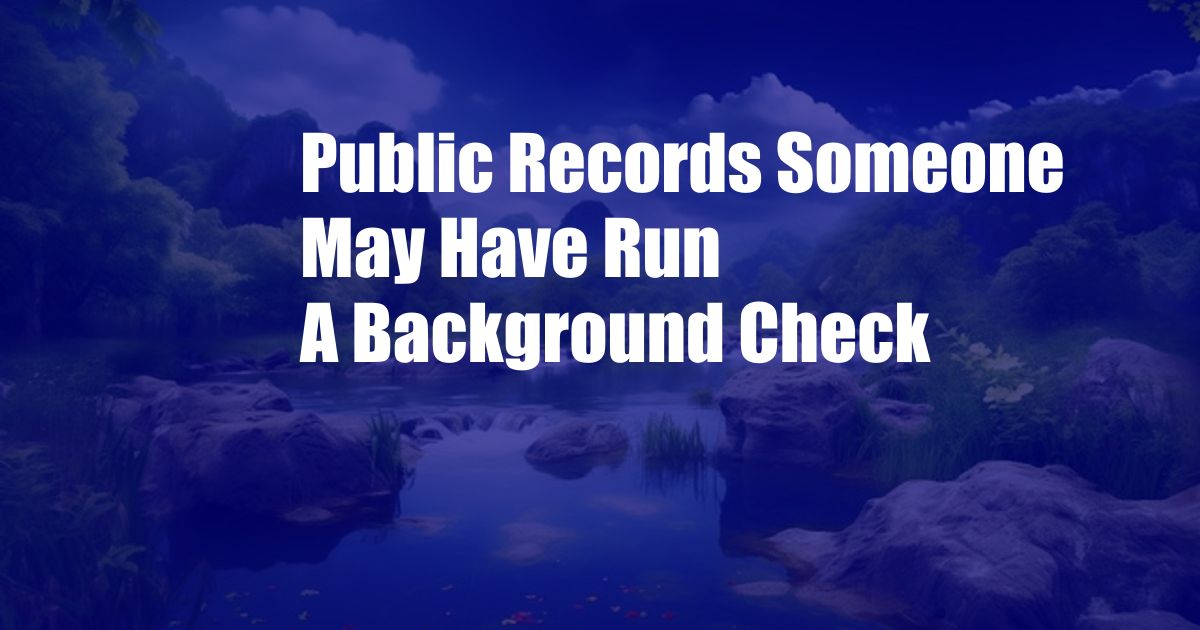
Public Records: What Information Can Be Found in a Background Check?
Ever wondered what information is available about you online? A background check can reveal a wealth of personal data, including your criminal history, credit history, and even your driving record. In this article, we’ll explore the different types of public records that can be accessed in a background check and discuss how to protect your privacy.
Background checks are commonly conducted by employers, landlords, and even potential romantic partners. By accessing public records, these individuals can gain insights into your past behavior and make informed decisions about whether or not to associate with you.
Criminal Records
One of the most common types of public records included in a background check is your criminal record. This record includes information about any arrests, convictions, and sentences you may have received. Criminal records are typically maintained by local, state, and federal law enforcement agencies.
It’s important to note that not all criminal records are created equal. Some offenses, such as misdemeanors, may not be reported on a background check. Felonies, on the other hand, are typically included. If you have a criminal record, it’s important to be aware of what information is available to potential employers and other interested parties.
Credit History
Another type of public record that can be accessed in a background check is your credit history. This record includes information about your credit accounts, payment history, and credit score. Credit histories are maintained by credit reporting agencies, such as Equifax, Experian, and TransUnion.
Your credit history can have a significant impact on your ability to obtain loans, credit cards, and even housing. If you have a poor credit score, you may be denied credit or offered less favorable terms. It’s important to regularly monitor your credit history and take steps to improve your score if necessary.
Driving Record
In addition to criminal and credit records, a background check may also include information from your driving record. This record includes information about your driving history, such as traffic violations, accidents, and license suspensions. Driving records are maintained by the Department of Motor Vehicles (DMV) in each state.
Your driving record can have a significant impact on your ability to obtain auto insurance and even find employment. If you have a poor driving record, you may be required to pay higher insurance rates or may be denied insurance altogether. You may also be disqualified from certain jobs that require a clean driving record.
Other Types of Public Records
In addition to the aforementioned types of public records, a background check may also include information from other sources, such as:
- Professional licenses
- Education records
- Military service records
- Bankruptcy records
- Social media profiles
The type of information that is included in a background check will vary depending on the purpose of the check. For example, an employer may only be interested in your criminal record and credit history, while a landlord may also want to see your driving record.
Protecting Your Privacy
If you’re concerned about the privacy of your public records, there are a few steps you can take to protect yourself:
- Request a copy of your public records: You can request a copy of your public records from the relevant government agencies. This will allow you to review the information that is available about you and correct any inaccuracies.
- Dispute inaccurate information: If you find any inaccurate information in your public records, you can dispute it with the relevant agency. The agency will then investigate your dispute and make a determination as to whether or not the information is accurate.
- Limit your online presence: Be mindful of the information you share online. Avoid posting sensitive information on social media or other public websites.
FAQ on Public Records and Background Checks
Q: What information is included in a background check?
A: A background check may include information from criminal records, credit history, driving records, professional licenses, education records, military service records, and bankruptcy records.
Q: Who can access my public records?
A: Public records are accessible to the public, including employers, landlords, and potential romantic partners. However, there are some restrictions on who can access certain types of public records, such as medical records.
Q: How can I protect my privacy?
A: You can protect your privacy by requesting a copy of your public records, disputing inaccurate information, and limiting your online presence.
Q: What can I do if I have a criminal record?
A: If you have a criminal record, you should be aware of what information is available to potential employers and other interested parties. You may also want to consider taking steps to expunge or seal your criminal record.
Q: Can I sue someone for running a background check on me without my consent?
A: In most cases, no. However, there are some exceptions to this rule. For example, you may be able to sue if the background check was conducted for an illegal purpose or if the information in the background check was inaccurate and caused you harm.
Conclusion
Public records are a valuable resource for employers, landlords, and other interested parties. However, it’s important to be aware of the privacy implications of background checks and to take steps to protect your personal information.
If you have any questions about public records or background checks, please consult with an attorney.
Are you interested in learning more about public records and background checks?